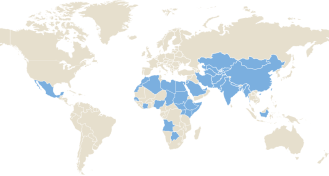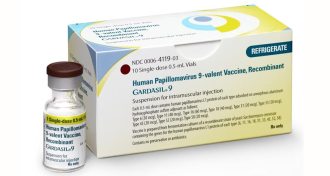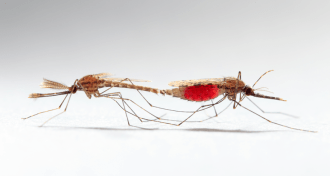Health & Medicine
-
 Health & Medicine
Health & MedicineArsenic spurs adaptation in Argentinian villagers
The people of San Antonio de los Cobres, Argentina, have genetic adaptations that may help them efficiently get rid of arsenic, a new study shows.
-
 Health & Medicine
Health & MedicineHepatitis E vaccine shows strong coverage
A large trial in China indicates that a vaccine can provide 87 percent protection against the hepatitis E virus, which infects 20 million people a year.
By Nathan Seppa -
 Health & Medicine
Health & MedicineReport offers stimulating recommendation on coffee
Results from a committee of experts give the blessing to moderate coffee intake. But as we all raise our mugs, the science behind the report is worth a closer look.
-
 Health & Medicine
Health & MedicineDose of extra oxygen revs up cancer-fighting immune cells
Extra oxygen helps immune cells shrink tumors in cancer-ridden mice.
-
 Health & Medicine
Health & MedicineDespite risks, vaccine delay requests are common
A survey of pediatricians and family doctors finds parents frequently put off vaccines for babies even though doctors warn it can place the children at risk of illness.
By Nathan Seppa -
 Health & Medicine
Health & MedicineSecondhand smoke exposure in womb linked to eczema in childhood
Secondhand smoke exposure in the womb may heighten risk of eczema and other dermatitis in children, a study finds.
By Nathan Seppa -
 Humans
HumansBreast-feeding newborns might limit their allergy to pets later
Breast-feeding newborns might limit their allergy to pets later by inducing a protective mix of gut microbes in the baby.
By Nathan Seppa -
 Health & Medicine
Health & MedicineCDC panel gives thumbs up to vaccine against nine HPV types
A federal vaccine advisory committee voted February 26 to recommend use of an expanded version of the human papillomavirus shot marketed as Gardasil.
By Nathan Seppa -
 Health & Medicine
Health & MedicineA little tablet time probably won’t fry a toddler’s brain
Good or bad, the effects tablet and smartphone use among toddlers demand more research.
-
 Life
LifeSexual conflict in mosquitoes may have worsened spread of malaria
Sexual conflict in Anopheles mosquitoes may have intensified their power to fuel human malaria.
By Susan Milius -
 Health & Medicine
Health & MedicineAdditives that keep foods fresh may sour in the gut
Additives called emulsifiers that are used in ice cream and other foods weaken the intestines’ defenses against bacteria, causing inflammation in mice.
-
 Health & Medicine
Health & MedicineCommunity protection against measles jeopardized
‘Herd immunity’ to measles may be threatened by low vaccination rates in some parts of the United States.